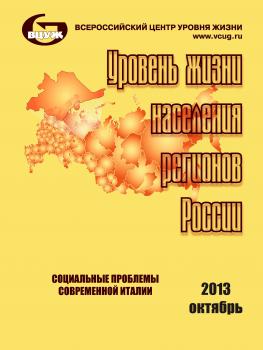Object. The object of study is the employed population of the Russian Federation, the influence of the unstable characteristics of its employment on the results of and attitude towards work in particular. Subject of the Research. The subject is studied theoretically by analyzing domestic and foreign sources in order to determine the term «precarious employment» and to identify theoretical and practical approaches to the definition of the main features and factors of the precarity. The author allocated approaches applicable for further empirical analysis, and approaches which might not be used. Empirical study of the subject is carried out through statistical analysis based on 21 waves of the Russian Longitudinal Monitoring health (RLMS) held in November-December 2012. Purpose. The main objective of the study is to assess the degree of influence of various indicators on the level of precarious employment of monthly labour income of employees and their job satisfaction. Theoretical Description of the Article. The article examines the impact of volatility on labour income, employment and job satisfaction of employees in Russia today. The frequency analysis and t-tests for independent samples are carried out, the average values of monthly earnings are calculated and job satisfaction among precarious workers and those not having considered factors of instability are compared. Results. On the basis of calculations significant conclusions on the impact of various factors on the precarious of employment and job satisfaction and labour income are drawn. A number of recommendations aimed at reducing the volatility of employment while increasing income and job satisfaction are given.
precarious employment, precarity, informal employment, job satisfaction, labor incomes
Введение
В современном мире неустойчивость занятости, прекаризация (от английского precarity — необеспеченность, шаткость, опасность, ненадежность) становится новым вызовом, как для России, так и для других стран. Данной проблемой озабочены не только специалисты трудовой сферы международного уровня (МОТ), но и специалисты Программы развития ООН, занимающиеся вопросами человеческого развития в целом. Известно, что проблемам занятости в докладах о развитии человека традиционно уделяется недостаточное внимание, однако то, что есть, посвящено именно неустойчивости: «Для большинства людей работа служит источником средств к существованию их самих и их семей; для многих потеря работы является важнейшим событием (вторым после смерти), которое может поставить под вопрос их развитие как человека. Статус занятости также влияет на субъективное ощущение благосостояния людей. Поэтому при любом анализе уязвимости нужно внимательно рассматривать негарантированность занятости и источники экономической нестабильности, что особенно важно сейчас, в условиях, когда мировая экономика прилагает титанические усилия, чтобы выйти из ситуации, возникшей в связи с самой глубокой за многие десятилетия рецессией и потерей миллионов рабочих мест» [17].
1. Bobkov V., Veredyuk O., Aliyev U. Ricks of Society Stability and Precarity of Emploiment: A look at Russia. The International Journal of Social Quality. 2013. Vol. 3. issue 1.
2. Lee C.K., Kofman Y. The Politics of Precarity: Views Beyond the United States. Work and Occupations. 2012. Vol. 39. № 4. R. 388-408.
3. Meeting the challenge of precarious work: A workers’ agenda / International Labour Organization. URL: http://www.ilo.org/actrav/info/WCMS_164286/langen/index.htm
4. Outcome Document to the Workers’ Symposium on Policies and Regulations to Combat Precarious Employment / International Labour Organization. URL: http://www.ilo.org/actrav/info/WCMS_179787/langen/index.htm.
5. Policies and regulations to combat precarious employment / International Labour Organization. URL: http://www.ilo.org/actrav/what/pubs/internationaljournal-labourresearch/WCMS_216282/langen/index.htm
6. Vives A. A multidimensional approach to precarious employment: measurement, association with poor mental health and prevalence in the Spanish workforce. Barcelona: Universitat Pompeu Fabra, 2010.
7. Vives A., Amable M., Ferrer M. et al. The Employment Precariousness Scale (EPRES): psychometric properties of a new tool for epidemiological studies among waged and salaried workers. Occupational and Environmental Medicine. 2010. Vol. 67. No 8. R. 548-555.
8. Bobkov V.N. 20 let kapitalisticheskikh transformatsiy v Rossii: vliyanie na uroven´ i kachestvo zhizni. Mir Rossii: Sotsiologiya, etnologiya. 2012. T. 21. № 2. S. 3-26.
9. Bobkov V.N. Lektsiya na ekonomicheskom fakul´tete MGU. 2014. 15 maya.
10. Bobkov V.N., Chernykh E.A. , Aliev U.T.O., Kuril´chenko E.I. Neustoychivost´ zanyatosti: negativnye storony sovremennykh sotsial´no-trudovykh otnosheniy. Uroven´ zhizni naseleniya regionov Rossii. 2011. № 5. S. 13-26.
11. Bobkov V.N. Neustoychivost´ zanyatosti v Rossii i Kazakhstane: sushchnost´, masshtaby, posledstviya / Institut ekonomiki Komiteta nauki Ministerstva obrazovaniya i nauki Respubliki Kazakhstan. URL: http://astanaforum.org/2014/ru/events/kazakhstan-2050-in-the-age-of-ten-global-challenges-of-xxicentury
12. Bobkov V.N., Veredyuk O.V. Neustoychivost´ zanyatosti kak sovremennaya problema i issledovatel´skaya kategoriya. Uroven´ zhizni naseleniya regionov Rossii. 2013. № 6. S. 43-51.
13. Bizyukov P.V. Praktiki regulirovaniya trudovykh otnosheniy v usloviyakh neustoychivoy zanyatosti. M.: Tsentr sotsial´no-trudovykh prav, 2013.
14. Veredyuk O.V. Neustoychivost´ zanyatosti: teoreticheskie osnovy i otsenki masshtabov v Rossii. Vestnik Sankt-Peterburgskogo universiteta. Ekonomika. Seriya 5. 2013. Vyp. 1. S. 25-33.
15. Gimpel´son V., Kapelyushnikov R. Nestandartnaya zanyatost´ i rossiyskiy rynok truda. Preprint WP3/2005/05. M.: Izd-vo GU VShE, 2005.
16. Doklad Byuro MOT po deyatel´nosti v interesakh trudyashchikhsya (AKTRAV), podgotovlennyy k prokhodivshemu v 2011 g. simpoziumu «Politika i zakonodatel´noe regulirovanie v bor´be s neustoychivoy zanyatost´yu» / MOT, 2011.
17. Doklad o razvitii cheloveka 2010. 20-e yubileynoe izdanie. Real´noe bogatstvo narodov: puti k razvitiyu cheloveka / Programma razvitiya Organizatsii Ob´´edinennykh Natsiy (PROON).
18. Kapelyushnikov R.I. Neformal´naya zanyatost´ v Rossii: chto govoryat al´ternativnye opredeleniya? M.: Izd-vo VShE, 2012.
19. Lyapin A., Noynkheffer G., Shershukova L., Bizyukov P. Ekonomicheskaya perspektiva dlya rabotnikov. Neustoychivaya zanyatost´ i ee posledstviya dlya rabotnikov. M.: Tsentr sotsial´no-trudovykh prav, 2007.
20. Petrova N. Tenevye rezervy. Pochemu rastet neformal´nyy sektor rynka truda / Portal «Kommersant´´-Den´gi». 11 noyab. 2013. URL: http://www.kommersant.ru/doc/2331478.
21. Rossiyskiy monitoring ekonomicheskogo polozheniya i zdorov´ya naseleniya NIU VShE. URL: http://www.hse.ru/rlms/spss
22. Sinyavskaya O.V. Neformal´naya zanyatost´ v sovremennoy Rossii: izmerenie, masshtaby, dinamika. M.: Pomatur, 2005.
23. Federal´nyy zakon ot 5 aprelya 2013 g. № 60-FZ «O vnesenii izmeneniy v otdel´nye zakonodatel´nye akty Rossiyskoy Federatsii».
24. Federal´nyy zakon ot 5 maya 2014 g. № 116-FZ «O vnesenii izmeneniy v otdel´nye zakonodatel´nye akty Rossiyskoy Federatsii». URL: http://www.garant.ru/hotlaw/federal/541247/





